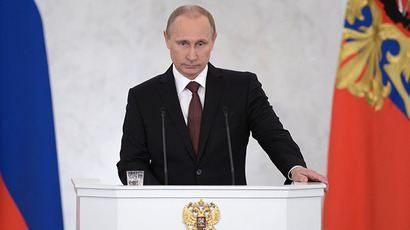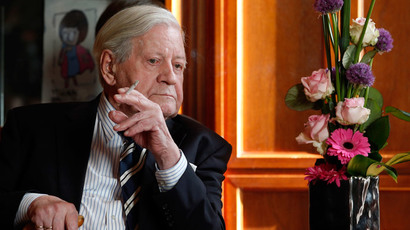US wants to destroy Ukrainian ‘bridge’ between EU and Russia – German intellectuals support Putin

Members of German civil society have written an open letter to Russian President Vladimir Putin, condemning Russophobia in mass media and German political establishment while showing support for Moscow's actions in the ongoing Ukrainian crisis.
Retired German Air Force Lieutenant Colonel Jochen Scholz wrote an open letter to the Russian leader in response to the speech Putin made on March 18, 2014 at the reunification of Crimea with Russia. The letter was cosigned by hundreds of Germans including lawyers, journalists, doctors, servicemen, scholars, scientists, diplomats and historians.
In that letter the German intellectuals said that Putin’s speech “appealed directly to the German people” and deserved a “positive response that corresponds to the true feelings of Germans.”
The letter acknowledges that the Soviet Union indeed played a decisive role in the liberation of Europe from Nazi Germany and supported the reunification of Germany and its ascension into NATO after the fall of the Berlin Wall and the dissolution of the Warsaw Pact.
Then US President George Bush Sr. had given assurances to Russia that NATO will not expand eastward, and yet despite Moscow's show of trust, the US and its allies violated that commitment, Scholz says.
“NATO expansion into the former Soviet republics, the creation of military bases in the former Warsaw Pact countries and the setup of an umbrella missile defense system in Eastern Europe, while unilaterally withdrawing from the ABM Treaty by the US is a flagrant violation of promises,” the letter reads.

According to the author, that was the West's demonstration of power and readiness to confront Moscow in response to the recent economic and political consolidation of Russia, which became apparent after Vladimir Putin was elected President back in 2000.
In an interview with RT, Scholz elaborated on his position claiming that the US interests and vision of the world order, where the continent is allocated the role of Washington’s “vassals”, differs from European interests.
“During the Cold War, the interests of United States and Europe where almost 100 percent identical. But since 1990 this has changed. European interests are objectively different than those of the US,” he told RT. “So our task here in Europe, and off course Russia belongs to it too, is to take our affairs in our own hands. To work with each other in peace and cooperation with respect for human rights.”
The Europeans are now “considered to be an obstacle in the way of American intentions in the region,” as revealed by the leaked telephone conversation between Assistant Secretary of State for Europe Victoria Nuland and US ambassador, Scholz says.
Having in mind the main US geopolitical goal of neutralizing Russia, the retired colonel believes, as stated in the letter, that Washington used the Ukrainian unrest as a “tool” to achieve it.
“This template was used repeatedly: in Serbia, Georgia and Ukraine in 2004, Egypt, Syria, Libya and Venezuela,” the letter addressed to Putin reads.
Discussing the Ukrainian crisis in more detail, Scholz emphasized that the main US objective was “to deny Ukraine a role as a bridge between Eurasian Union and European Union.”

“Instead they want to bring Ukraine under the NATO control,” retired serviceman told RT, stressing that he supports Putin's proposal to build a “common European House,” united under “a common economic zone from Lisbon to Vladivostok.”
Therefore, the author and the cosigners of the letter support the actions taken by Russia as a counterweight to US interests.
“Based on the background of the developments in Europe since 1990, the establishment of some 1,000 US military bases around the world, control of sea straits by the United States, as well as the danger posed by the abuse from Maidan for the Russian Black Sea Fleet – we consider the separation of the Crimea as a defensive measure and, simultaneously, as a warning: this is a line that cannot be crossed,” the open letter states.
While accepting Kosovo's unilateral declaration of independence in 2008 as a precedent for self-determination of Crimea, the letter said that the principle difference in comparison is clear. Unlike Crimea, the Kosovo process was “violating international law by the NATO air war in which Germany unfortunately participated.”
In conclusion of his letter Scholz expressed hope that European nations can agree not to interfere in other nation's affairs which can act as a guarantee of peace in the rest of the world. He called Vladimir Putin an ally of Europe and wished him “strength, endurance and wisdom.”
Commenting on the position of the German government towards Russia at the moment, Scholz told RT that Berlin is in a “very difficult position” as a member of EU and NATO as goals of these blocs contradict German desire “to develop closer relationship with Russia.”
“We should develop our neighbor policy together with Russia and on that way we can move forward. But in any case there should be no further expansion of NATO towards the Russian borders,” he told RT.














